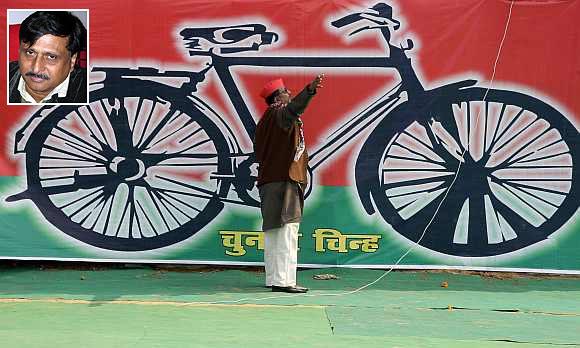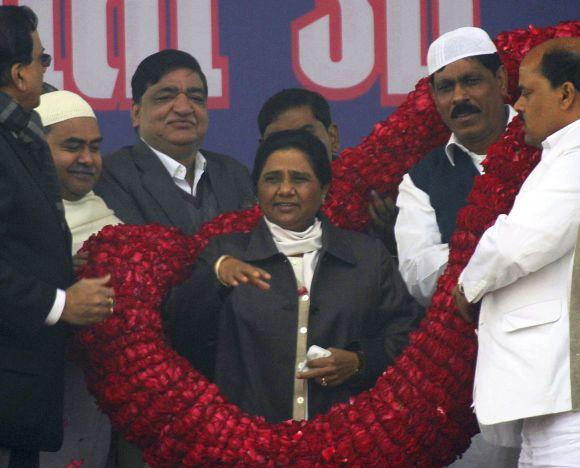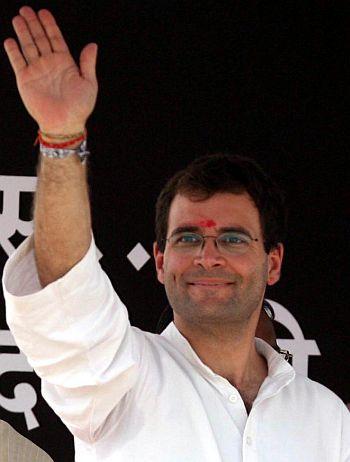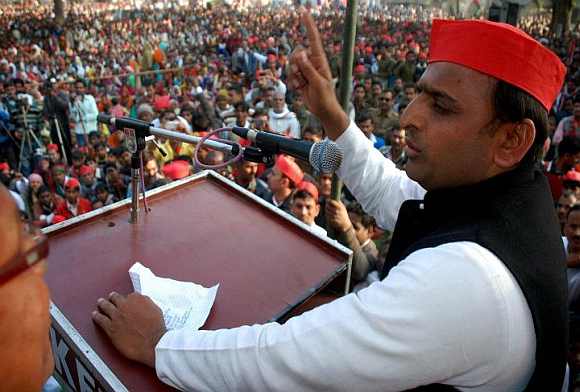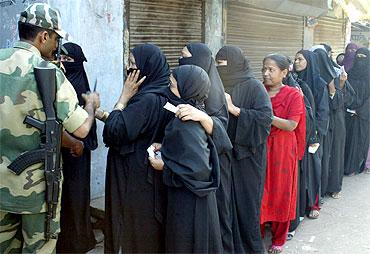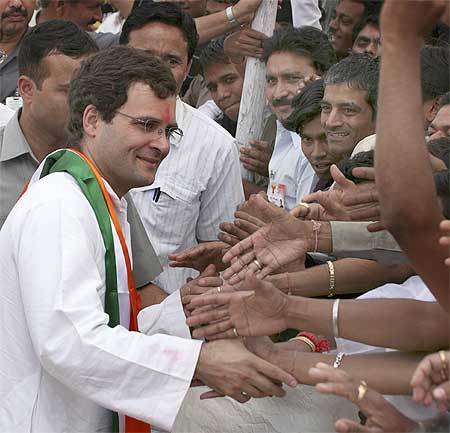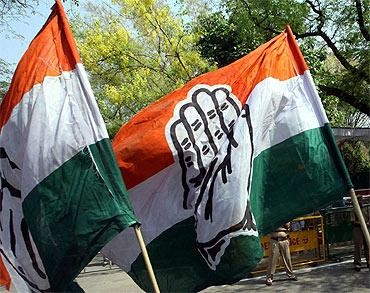 | « Back to article | Print this article |
'Put your bets on the Samajwadi Party and the Congress'
The second part of Sheela Bhatt's series where well-informed Uttar Pradesh residents discuss the psyche of voters, the personalities of its leaders and the socio-cultural lives of the people of the election-bound state.
The most prominent feature of the ongoing election in Uttar Pradesh is that there is a kind of stillness in the air.
The voters are silent. They judge you before they share their voting preference. On the surface they have been quiet, but they have spoken with a roar if one looks at the voting percentages in the first two phases of the assembly election.
Around 35 percent more voters have been added in this election compared to the 2007 assembly election.
While explaining the higher voter turn-out, the prominent Hindi daily newspaper, Dainik Jagran, in a front-page report on Sunday, February 12, termed it as a maturing of Indian democracy.
Dainik Jagran said it is perplexing to see that in spite of the lack of credibility of political leaders and the absence of any visible political undercurrent for or against any party, UP's voters are thronging to polling booths.
Professor Rajesh Misra, head of the sociology department at Lucknow University, terms the increase in voting percentage as nothing short of a "political earthquake."
Many experts believe this election is confusing because the preference of new voters is not easy to judge. Will UP's youth voters vote for the Congress's Rahul Gandhi, the Samajwadi Party's Akhilesh Yadav or the Bharatiya Janata Party?
Anti-incumbency sentiment against Mayawati's ruling Bahujan Samaj Party is quite visible amongst non-Dalit voters. Where will the anti-Mayawati votes shift?
Will young voters cast their votes on caste lines or will they look for the candidate who is in a position to secure development for the region?
The analysis of these three crucial questions are as perplexing as the UP voter's mind. If compared to social activist Arundhati Dhuru's views, Misra, in an interview conducted on the Lucknow University campus, forwards completely different arguments.
He advised Sheela Bhatt to put her bets on the Samajwadi Party and the Congress.
Please check Rediff Realtime News for updates on the UP election
Please click NEXT to read what Professor Misra says...
'The BSP is going to lose badly'
How do you assess the socio-political importance of this election?
Every election is important, socially and politically. This election is more important for various reasons. In the first phase, we saw a tremendous increase in the voting percentage. Perhaps nobody could imagine such a huge increase in the percentage.
The actual increase is around 16 percent. In the last assembly election, we had only 46 percent voting. Now it is more than 62 percent. If we put this figure relatively, we find the actual increase in size is more than 35 percent.
More than a third of people has been added to the critical mass this time. Perhaps in all the other phases we will have around 60 percent voting or more.
The Election Commission should be given the main credit for people's increased participation. In the past, during election time, the media was asking different questions. The reports were all about booth capturing and about re-polling. But this time in UP, there is no re-poll. It is very significant.
Now it is established that the Indian people are ready to come out to vote. And due to the EC's initiatives, you can see every booth on a Web site. What kind of voting is taking place is not difficult to know now.
Another thing you will find this time is that you can see only the Election Commission's posters all over UP rather than posters of the political parties.
As most experts are saying, this increase in voting is due to the increase in voting by youth and first time voters. There is a higher increase in voting in urban areas in comparison to rural areas. There is more voting in rural areas as well, but much more increase is seen in the urban areas.
We have seen in the past that around 60 percent people voted in UP when the Emergency imposed by Indira Gandhi was lifted. Around 60 percent people voted in the election held after the death of Indira Gandhi.
In 1993, in the election held after the demolition of the Babri Masjid, we saw 57 percent voting. So, all those three elections were such where voters voted on emotional issues.
But this time no emotional issue is present. I think that young voters are more rational than emotional. And this would definitely have some impact on UP politics and the next government in the state.
I don't have scientific data, but my first-hand observation is that young voters are not much concerned about caste or those kinds of things. They do not admit which things they are more concerned about, but they are not concerned with their caste.
I want to emphasise that the beginning has taken place. That is the most important development of the election which would have repercussions on the political parties.
If my premise -- that these young voters have not voted on caste lines -- is correct, then they would have voted against the Mayawati government. They represent the anti-incumbency sentiment.
Such a significant rise in voters has to be due to anti-incumbency voters. They will vote against the government.
Perhaps, the Bahujan Samaj Party is going through a bad phase. One thing seems clear -- the BSP is going to lose badly.
Two, when there is an increase in rational young votes at a time when two political youth icons are in the field -- one representing the SP (Akhilesh Yadav) and one representing the Congress (Rahul Gandhi) -- naturally, the youth will favour the SP or the Congress, only. There would be a concomitant rise of both parties.
In every election you need a different kind of political engineering. The kind of social engineering -- Dalits and Brahmins were united under the BSP banner -- Mayawati used in the 2007 election was relevant in those times. Now, the needs are different.
Please check Rediff Realtime News for updates on the UP election
Please click NEXT to read what Professor Misra says...
'Rahul Gandhi is playing clever politics'
Has the BSP's social-engineering failed because the organic merging of the Dalits and Brahmins is not happening?
That cannot happen! At the given juncture, that cannot happen because of various reasons. Although democracy has arrived, we are still a caste-ridden society.
I saw that Brahmins, in Mayawati's rule, cornered every favour of the state.
When I went to some villages I found that the Brahmin is the head of the block level political set-up of the BSP and all the workers are Dalits.
So even at that level, Brahmins started dominating within the party and in the power structure. I can't say if the Brahmin-Dalit political partnership has ended for all time to come, but in this election it did not work.
How do you see Rahul Gandhi and his performance?
It could have been better. Surely, there is growth of Rahul Gandhi as a politician. He looks more articulate, he is more communicative, and he is more confident.
On Rahul Gandhi, I would like to say one thing, which may be true. If you study the Congress style of politics and the Congress style of thinking which is represented by Rahul Gandhi, I find that Rahul Gandhi is thinking of the long term.
For 10 years, Rahul Gandhi is not going to be the prime minister or any kind of minister. The family has very clearly understood that renunciation is a virtue and through renunciation they can control the party politics of the Congress as well as others.
What I want to say is that Rahul Gandhi wants to win the next election, not this election.
And if a coalition government comes, you would find that the next UP assembly election would take place with the 2014 general election. He is playing clever politics.
Rahul Gandhi's discourse is a developmental discourse, a youth discourse and a political discourse. At the same time, Rahul Gandhi is very clear that he is addressing the 2014 election.
I think the result of this election would be very bewildering. When I see this high rate of voting I think there could be a sweep in favour of one political party.
Maybe, the SP or the Congress, I can't say at the moment. Definitely 35 percent increase means something. It is so tremendous; any political party can see this phenomenon.
My guess is if voting takes place at this rate, the SP may emerge in the first slot and the Congress would be near second. I am saying so only because of the overwhelming voting, otherwise the situation would have been different.
The increase in urban voters may also provide the BJP an opportunity. They would get around 50, 60 seats. The BJP holds its strength because of the increase in urban voters and because of the influence of the Anna Hazare movement.
The issue of corruption is not in the forefront, but it may be an issue at the back of the minds of young people.
Please check Rediff Realtime News for updates on the UP election
Please click NEXT to read what Professor Misra says...
'The SP was in the forefront fighting against the government'
Why is the SP getting such a response?
There is a change in the form of leadership. Akhilesh is in the forefront. He is talking the same discourse that youth would like.
Two, in the last five years, only the SP was in the forefront fighting against the Mayawati government. When there was any policy that was not pro-people, they were on the roads.
Third, they have a support system at the local level. They have cadres at the local level so they can transform the support to the party into votes.
When the youth of Uttar Pradesh go to the polling booth with aspiration for development, who do you think they will vote for? Akhilesh or Rahul?
Most probably, Rahul.
When development is an issue, perhaps at this time, people would vote for any national party. Because the regional models are failing in the eyes of the people.
Then why are you not saying Rahul Gandhi will win handsomely?
Maybe he will win handsomely in the next election. The SP is the natural Opposition party. The credibility of the BJP is under question in UP.
The BJP is in tremendous decline in UP, in the assembly election and in the Parliament election. Whenever they were given an opportunity, they could not fulfill their promises.
In the BJP, factionalism is quite deep and the party doesn't have leaders in UP.
Please check Rediff Realtime News for updates on the UP election
Please click NEXT to read what Professor Misra says...
'Mayawati may lose, but Mayawati is going to stay'
What do you think of Muslim voters this time?
The Muslim vote is very important. As reports suggest, in the days before polling, in some pockets there was influence of various parties, particularly in Muslim ghettos. Not in the rural areas, but in the urban ghettos.
In the eastern part of UP, the Muslims may not vote calculative or rationally, perhaps.
The situation would favour the BJP. The BJP is likely to gain in the eastern part because then the vote would polarise. See, there is an increase in voting in urban areas. Already, Muslim voting is high from the last elections.
The new addition from urban areas will help the BJP because the increase in voting is mainly from the majority communities.
But in western UP the situation is different. In the last election the BJP gained, but this time they will lose certain seats in the western areas. In eastern UP, many Muslims will support the Peace Party and that would help the BJP.
How do you look at Mayawati's prospects?
She wouldn't be wiped out, but she will be hurt. But if Mayawati's party gets weaker, then there is every chance it would break. That has happened.
Mayawati's positive side is that as a women leader and as a Dalit politician she will rise again and again.
Another important aspect of her is that she has created political symbols. That is her success.
These Ambedkar parks and these statues she has taken to the doors of the people. If the SP comes to power they will definitely attack her political symbols. And that would help her. Again, Mayawati would gain some strength.
Mayawati has created a support structure which is more aware, more conscious and ideologically different. Mayawati may lose this election, but Mayawati is going to stay.
Please check Rediff Realtime News for updates on the UP election
Please click NEXT to read what Professor Misra says...
'Increase in voting percentage is, in fact, an increase in rational voters'
What is not working out well for Rahul Gandhi?
My guess is that in this election Rahul Gandhi will definitely gain. His endeavour to identify with a certain section of society is helping him. Younger voters will also help him.
In this election, the Election Commission has limited the role of the political party's cadres. You won't see many political representatives at polling booths. People are voting without any prodding or help. The role of the cadre at the local level has been diminished.
So the argument that the Congress doesn't have cadres to translate Rahul's hard work into votes is not an issue now.
What will be the long-term impact of Election 2012?
There is one problem with this election. The voters have limited political socialisation. There are very few posters and there is a low level of propaganda. Will the EC take the initiative for social connect in coming elections?
In the future, if the trend continues, I hope there would be limited impact of caste and community, limited impact of emotional issues and more rational voters.
Ultimately, this would bring issues to the forefront. I feel the increase in voting percentage is, in fact, an increase in rational voters. The rational voter means issue-based voting.
Please check Rediff Realtime News for updates on the UP election
Please click NEXT to read what Professor Misra says...
'Better if a new government is formed without Congress support'
So, what kind of post-poll scenarios are you looking forward to?
If the SP gets 160/170 seats, then the Congress will support it from outside till the 2014 Lok Sabha election. The Congress will take the same stand if the BSP gets a higher number of seats.
The denial by the BJP and Congress of any alliance with the BSP or the SP is just opportunism.
If the SP gets an overwhelming number of seats then Ajit Singh can break away from the Congress to join an SP-led government along with a breakaway group from the BSP.
It would be better if a new government can be formed in Lucknow without the outside support of the Congress.
I feel the way things are moving, the BSP would remain the less important party and there would be expansion of the SP, the Congress and the BJP.
Please check Rediff Realtime News for updates on the UP election
Please click NEXT to see other interesting slide shows...
